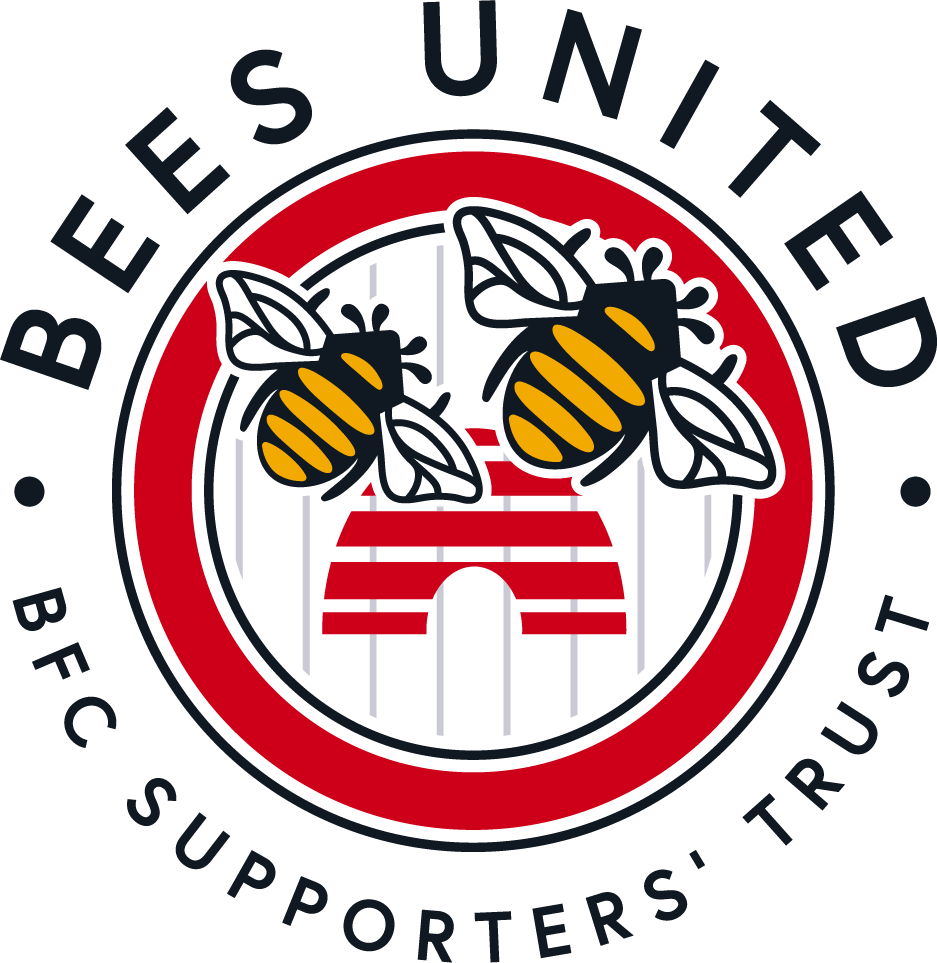Matthew Benham said “When I first came to Brentford, in 1979, there were terraces on all four sides of the ground and the large Royal Oak end loomed over the rest of the ground. The historic Division One days of the 1930s and 40s were still remembered by some and there was a ground designed to house one of the biggest clubs in the country….and the reason why Brentford became one of the biggest clubs in the country can be largely attributed to one man – Harry Curtis. I hope that, under my ownership, Brentford can get back to where we were in the 1930s and 40s. That is certainly what we are aiming for.”
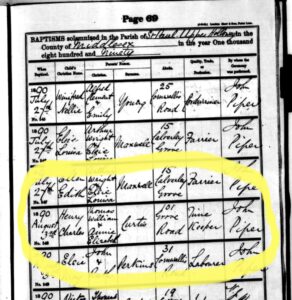
Harry was born Henry Charles Curtis on 22 January 1890, at 101 Grove Road, Holloway.
The baptism records at his local church record that his father was Thomas Curtis a ‘time keeper’. He was the youngest of two brothers and two sisters.
Traces of Harry’s early life can later be found in Walthamstow in the 1901 census by which time, Harry’s mother, Annie had re-married after the death of Harry’s father soon after Harry was born and taken her three sons with her.
Harry was married in 1915 to Gertrude Shilton, and later that year their first son, Ronald, was born. It is said that around this time Harry was playing for amateur sides Romford and latterly Walthamstow Grange.
Harry had the bug by then and was appointed secretary for the amateur side Gnome Athletic (“probably the best amateur side in the country” – Globe newspaper), which was the works team of Peter Hooker Limited, in Walthamstow. This company manufactured engines under licence from Société des Moteurs Gnome et Rhône Engine covering a 26-acre site with nearly 1800 employees. A stock exchange listing in 1917 was not successful, the business was sold to BSA who liquidated the business and the premises, were sold.
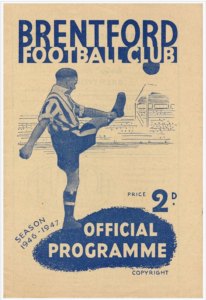
Gordon was Harry and Gertrude’s second son born in 1921.
Gordon featured regularly on the cover of Brentford’s programmes from the mid to late 1940s.
This example is from the 1946/47 season.
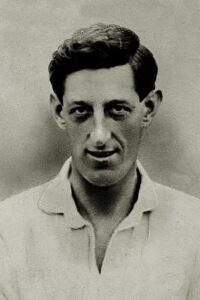
Alf Capper
Harry qualified as a Football League referee after taking up the whistle during the First World War.
On 11th February 1922 became part of Brentford history (some time before his formal arrival at Griffin Park) when he sent off Bees defender Alf Capper against Newport County.
Alf was the first Brentford player to be dismissed in a league match.
Luck and skill go well together in football and Harry’s move into football management had a good bit of the former.
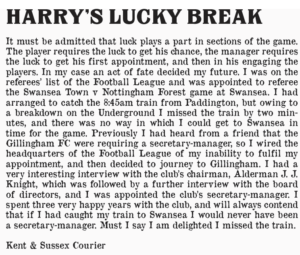
Harry was due to referee a match at Swansea Town in 1923, but he missed that train on account of a broken-down underground train.
Who knows why, but, Harry then headed off in completely the opposite direction, to Gillingham, to watch a match and decided to enquire about the vacant managerial role. He was interviewed and was offered the post. Over three years at Priestfield, Gillingham made steady progress, finishing 15th, 13th and tenth in Southern Section of the Third Division.
Then, in the 1925/26 season, Harry went to see Brentford play Southend in a midweek game where he bumped into F.W. Barton, a Bees director, and joked whether they might need a good manager.
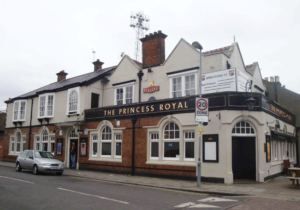
107 Ealing Road, Brentford TW8 0LF
Brentford took Harry seriously and subsequently interviewed him at the Club’s then HQ, the Princess Royal, on the corner of Braemar Road and Ealing Road (now gone), for the Secretary-Manager’s post .
The Club awarded Harry the role on a 12 month contract with the task of lifting a club that had struggled since its election to the Football League to find any sort of form.
His first season at Griffin Park saw Bees’ cup success, when we reached the FA Cup Fifth Round proper for the first time in the Club’s history losing 0-1 to Reading. A programme from 1926 talks of Harry’s skills at buying and selling players at a profit. The programme states that the method of selling players at a profit was not something Brentford was interested in and the supporters fully approved!
Sadly, poor away form meant that Brentford would have to wait a little longer for promotion, however. By this time Harry was “The Guvnor”. He was by then the heartbeat of Griffin Park.
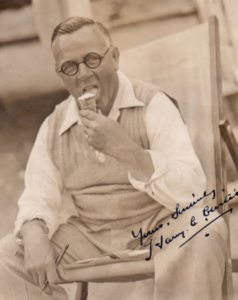
In May 1932, he signed Jack Holliday, Bert Watson, and Billy Scott for a total of £1,500, probably the best transfer deals in the Club’s history. The three players gave great service to the Club over the next decade. Brentford romped home to the Third Division South title the next season and would at last compete in the top two tiers of English football.
Perhaps, even then, the life of a (successful) football manager was a good life, and well rewarded, as in 1934 there is evidence that Harry had moved from his house in Windmill Rd to own a large newly built house near Boston Rd. in Boston Gardens The rate book records that he had a house, a garden and a garage.
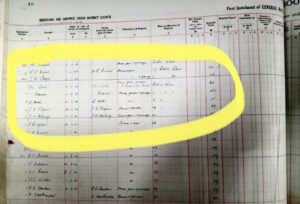
The Club missed out on automatic promotion the season after, eventually finishing fourth but the next season [1934/35] would see Brentford Second Division Champions, after securing promotion with a 3-2 win away to Bradford. Harry was busy at Griffin Park with the reserves but confessed, “I think I must have become delirious, for I threw my hat in the air, went racing down the stairs to my office, only to wonder what I had come down there for! “
Within nine years, Curtis had led Brentford to the top flight in English football and in those days the crowds were huge as we can see from the reported, 33,481 crowd at the Huddersfield match September 7th, 1935.
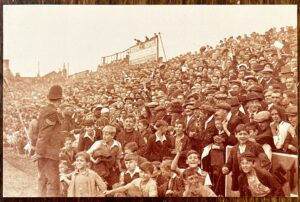
In February 1936 Harry signed a new five year contract and three months later the Club finished fifth in Division One, a record that has never been bettered. After two seasons when Brentford finished in sixth place, the latter of which where they led the First Division for three months, they then flirted with relegation in 1938/39.
The Second World War broke out in September 1939 and all domestic competitions were suspended even though Harry stayed in touch with his team, writing even to his reserve team players,wishing they could return to Brentford.
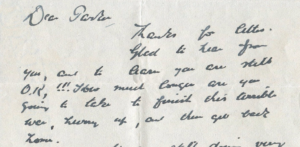
To Tom Parker – reserves, October 1944 – Dear Parker, Thanks for the letter. Glad to hear from you and to hear you are still OK!!! How much longer are you going take to finish this terrible war, hurry up, and then get back home.
The war gave Harry his only cup success with Brentford in May 1942, with the Bees beating Portsmouth 2-0 in the London War Cup in front of 69,000 spectators at Wembley.
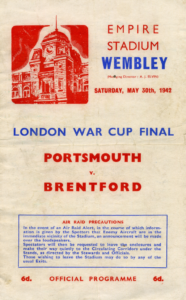
Retrospectively, the death of Brentford President Louis P. Simon in 1943 had a direct effect on the Club’s post-war history. The relationship between the two had ensured Brentford’s rise up the leagues and the Club’s immediate post-war history would see relegation in 1947. Harry Curtis struggled to attract good new players to his then ageing squad, and Brentford would be playing Second Division football for the first time in 12 years.
Harry bowed out with a testimonial at Griffin Park in May 1949 with a fund of £1,370.
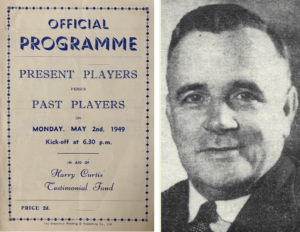
After 23 years in charge following the announcement in February that forward Jackie Gibbons would be the new manager for the 1949/50 season, the local paper, The Brentford and Chiswick Times, reported that Harry received a cheque as a parting gift, “known to be over four figures”.
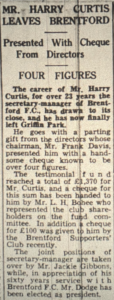
On January 30, 1966, in 126 Southchurch Avenue, Southend-on-Sea, Harry died aged 76. His occupation on his death certificate was given as freelance journalist.
Harry’s legacy is there for all to see, two Championships, a war cup win at Wembley, plus a stadium that grew into an arena to hold almost 40,000 spectators. His like will never be seen again and Harry was posthumously inducted into the Brentford Hall of Fame in May 2015.
With thanks to Dave Lane & Mark Croxford, Legends Publishing, ‘Harry Curtis The Brentford Manager’
A short video ‘Brentford’s Golden Era -The Harry Curtis Years‘ was made to help launch the book.
